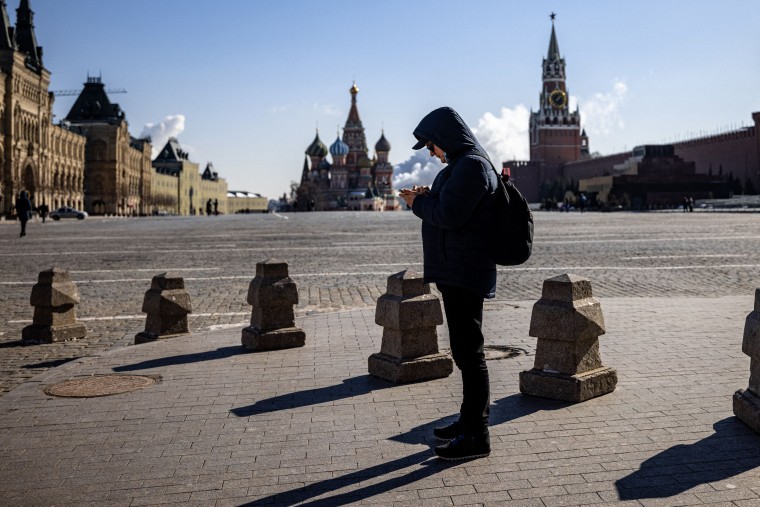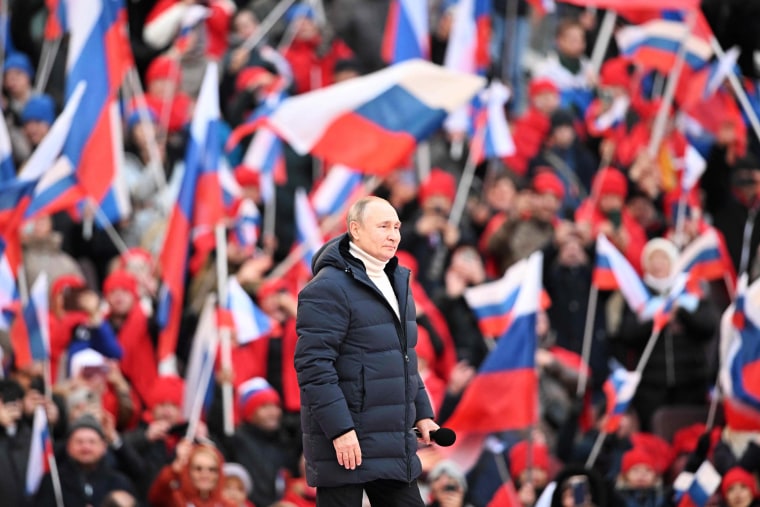LONDON — Russian bloggers and businesses, already hammered by the knock-on effects of international scrutiny and sanctions, are scrambling to deal with the loss of one of their most important platforms: Instagram.
The Kremlin’s increasingly strict limits on freedom of expression in the wake of its Ukraine invasion have had far-reaching consequences for ordinary Russians.
For some small and medium-size businesses in particular, the ban on Instagram has meant further financial turmoil just as inflation has skyrocketed and goods are harder to obtain thanks to crippling sanctions imposed by the United States and its allies.
With the app's users facing lost earnings and audiences, many rushed last week to post links and QR codes to alternate social media accounts. Some have maintained access to the platform through a virtual private network that masks internet activity by encrypting users’ location and web traffic.
That's been the case for designer Elena Igonina, who launched the first collection of her Moscow-based fashion label just as the Covid-19 pandemic hit in 2020.
The brand has relied on Instagram to drive sales, with around 90 percent coming from the platform, she said. The block has meant her brand has taken a “huge financial loss.”
“Our reach on Instagram has already dropped by 70 percent,” she told NBC News in messages on WhatsApp last week. “A small business without big investment had a chance only with Instagram.”

The war’s greatest toll has been on Ukraine, where millions have been forced to flee their homes and civilians across the country are trapped under bombardment from Russian forces.
But the conflict has also changed Russia. Between sanctions, the exodus of Western brands from the country and the government’s media crackdown, the connection of many Russians to the outside world has been disrupted.
Since the downfall of the Soviet Union, Russia’s economy has become increasingly global. That’s also meant the lives of many residents in major Russian cities don’t look all that different from those in New York, London or Berlin — from the social media platforms they use to the Western clothing and fast-food brands they buy.
Blogger Natalia Konstantinova uses her social media accounts to show off life in St. Petersburg to an English-speaking audience. With more than 35,000 users on Instagram and 300,000 on TikTok, she has gone from posting about issues like how snow-covered roads are cleaned to videos of shuttered Western shops in the weeks since the invasion.
“The main goal of my account was to bring people from outside Russia closer to Russia,” Konstantinova, 33, told NBC News in a phone interview. “That we are not barbarians, like the whole world thinks now. All my work is for nothing, all of these years.”
Instagram has said it had around 80 million users in Russia, a country of 146 million. Instagram’s head, Adam Mosseri, estimated last week that around 80 percent of Russian users follow an account based outside the country. That includes many Russian language accounts of expats showing off their glamorous lifestyles in London or Dubai, in the United Arab Emirates, who may also now face a drop in their followers.
Moscow blocked the platform in response to parent company Meta’s decision to allow users in Ukraine to post messages such as “Death to the Russian invaders.” Facebook was already banned over what the government said were restrictions it placed on access to Russian media. On Monday, a Moscow court ruled that Meta was guilty of “extremist activity,” according to the Interfax news agency, solidifying the ban on those two platforms.

For Russia-watchers, the government’s block on Instagram was less of a surprise than it was for many residents.
“It’s been the goal of the Kremlin for many years to have total control of information within the country,” said Alena Epifanova, a research fellow at the German Council on Foreign Relations. “The main impact will be that many people will lose income and a platform to promote their ideas.”
Despite the Kremlin’s crackdown, many influencers and businesses have continued posting with the help of VPNs. Online searches for VPNs have skyrocketed in Russia since the block was announced.
“When Facebook and Twitter were officially blocked on the 4th and 5th of March, we thought we saw the peak with searches 1,000 percent higher. This is double that and close to triple,” said Simon Migliano, head of research at Top10VPN, a London-based company that monitors internet usage and internet research.
“It shows how much Russians love Instagram,” he added.